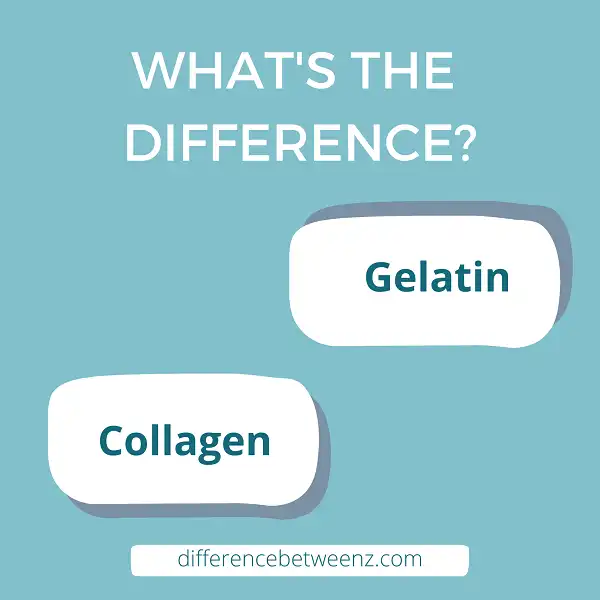Gelatin and collagen are both proteins that are derived from animal tissue, but they have different functions in the body. Gelatin is made up of smaller proteins that form a thick web-like structure, while collagen is made up of larger molecules that provide strength and elasticity to tissues. Gelatin is typically used in food products as a thickener or stabilizer, while collagen is used in supplements and skin care products to promote healing and regrowth. There are many benefits to taking collagen supplements, including improved joint health, reduced signs of aging, and better digestion. Collagen supplements are safe for most people to take, but it is important to speak with a doctor before starting any new supplement regimen.
What is Gelatin?
- Gelatin is a protein substance derived from collagen, a major component of animal skin and bone. It is used in food production as a gelling agent, thickener, and stabilizer. Gelatin is also used in the manufacture of some types of paper, glue, medication, and photographic film.
- Commercial gelatin is typically produced from the hides and bones of pigs and cattle. These animal by-products are treated with acid or alkali to extract the collagen. The collagen is then purified and bleached before being dried and ground into a powder.
- Gelatin has many properties that make it valuable in food production. For example, it is able to absorb five times its own weight in water, making it an excellent thickener for soups, sauces, and desserts.
Additionally, gelatin has a neutral taste that does not alter the flavor of foods. It is also very stable, meaning that it will not break down under high temperatures or freeze-thaw cycles.
What is Collagen?
Collagen is the most abundant protein in our bodies, and it plays an important role in supporting the structure of our skin, muscles, and bones. While we tend to think of collagen as being found only in animal-based products like beef or chicken, it is actually found throughout the natural world – in both plants and animals.
In humans, collagen typically makes up about 30% of the protein content in our bodies. However, as we age, our bodies produce less collagen, leading to wrinkles and other signs of aging skin. There are several ways to increase collagen production in our bodies, including dietary supplements, topical creams, and even laser treatments.
Difference between Gelatin and Collagen
Gelatin and collagen are two substances that are often confused with one another. Both are derived from animal products, and they both have a number of benefits for health and wellness. However, there are also some key differences between the two.
- Gelatin is a protein that is derived from collagen. It is commonly used in food products, such as jelly and pudding, as it has the ability to thicken and gel. Collagen, on the other hand, is a structural protein that helps to give the skin its strength and elasticity.
- It is also found in other connective tissues, such as tendons and cartilage. When taken as a supplement, collagen can help to improve joint health, skin appearance, and gut health. So, while gelatin and collagen may share some similarities, they are actually quite different when it comes to their composition and benefits.
Conclusion
Collagen is the most abundant protein in the body, providing structure and strength to skin, bones, teeth, muscles, tendons, and ligaments. Gelatin is a form of collagen that has been hydrolyzed into individual amino acids. This makes gelatin more easily digestible than collagen. Gelatin can be found in bone broth (a popular health drink), Jell-O shots, gummy bears and other candies, marshmallows, and even some ice creams. Collagen peptides are a type of supplemental collagen that can be taken as a pill or powder. They are said to help with joint pain, gut health, skin elasticity, and anti-aging effects.


